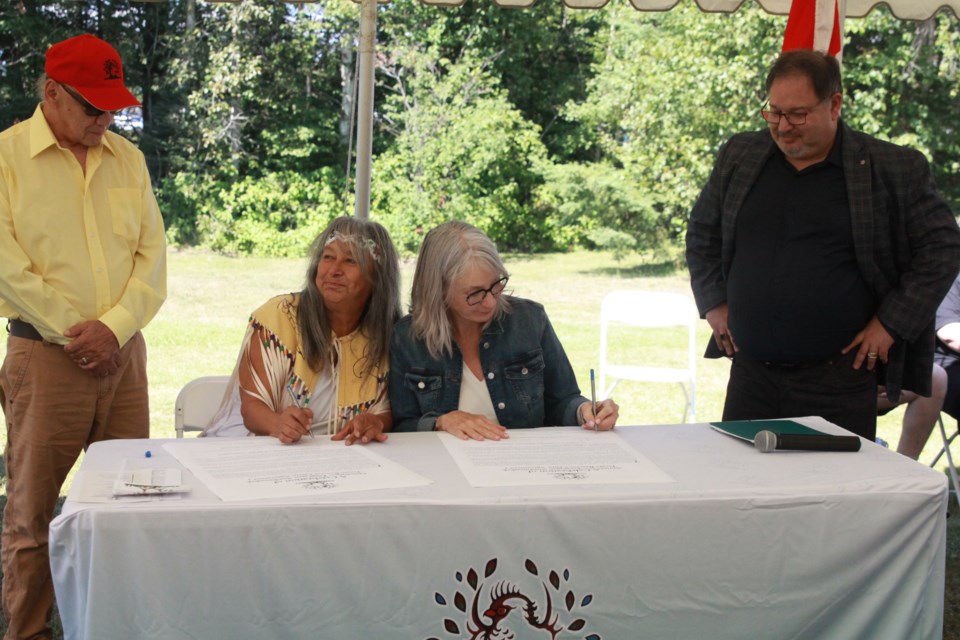THUNDER BAY – Members of Animbiigoo Zaagi’igan Anishinaabek celebrated the signing of the Animbiigoo Zaagi’igan Anishinaabek Treaty Reserve claim agreement on Saturday at Chippewa Park.
The signed agreement states it “advances reconciliation and furthers a renewed nation to nation relationship based on co-development partnership and mutual respect, and is worth $130 million to address the First Nation's Treaty Reserve claim against Canada.
“It lays the foundation for a straightened partnership between Animbiigoo Zaagi’igan Anishinaabek and Canada.”
Chief Yvette Metansinine of Animbiigoo Zaagi’igan Anishinaabek, said they did not receive a reserve back in the signing of the treaty.
“We worked so hard to get to where we are today. This means that our community can start healing and start the next journey as we move forward to our new reserve called the Lake Nipigon Reserve.
“We still have negotiations with Ontario. That will be the agreement number two.
“We have to start identifying potential land within our traditional territory. And once we negotiate on that, we will be granted land and it will become reserve status.”
Metansinine said she’d like to also extend the reserve boundary to make it a bigger reserve for the future generations to come.
During the celebration, a youth from the community spoke on what this will mean for him, and for future generations.
“I was so humbled by Kyle. (He) is a true leader and I could only foresee him being a part of community development as we move forward to build our reserve.
“It makes me feel that I'm doing a good job when we have our youth involved and they're understanding of where we were and where we're at today. It makes me so proud that we have our young people that admire all the work that we've done and acknowledge that,” Metansinine said.
Members have worked for almost 40 years to get to where they are today, she said.
“It’s a huge milestone and we finally accomplished what we always wanted to do – to bring our people home and to get a reserve that was rightfully ours.
“We shouldn't have been forgotten, however we were. But you know what, we are resilient people as you can see.
“We managed to live in urban communities and stay connected, and now we have a reserve and pretty soon we'll be living like a community on our new reserve,” she said.
Thunder Bay-Superior North MP Patty Hajdu, who is the minister of Indigenous services, said hearing from members of Animbiigoo Zaagi’igan Anishinaabek was powerful.
“Today was a celebration of the signing of an agreement that recognizes Animbiigoo Zaagi’igan Anishinaabek’s claim to loss of land and the use of that land through dispossession many, many years ago.
“It's in a negotiated settlement that allows the community to move forward in a spirit of healing with a full recognition that what the Crown did was wrong and that it caused enormous suffering for their members over the years.”
The community now has some decisions to make in terms of what the next steps look like and how they will use some of the financial resources, Hajdu said.
“For example, they have been working on building up the infrastructure in their community, building homes so that people can choose to return home and live near the shores of Lake Nipigon.
“There's a phase two that will also be negotiated with the government of Ontario to restore some of their traditional lands to the community so that they have those lands for the next generations.”
Hajdu said she has heard constituents tell her about the stories of losing their land and losing their identity.
“We had a youth who read what (this) means. I think his last line was so powerful. He talked about ‘this means that we will always have a place to call home.’
“Ultimately, these are the ancestral lands of his ancestors and now his descendants.”
In the process of creating reserves, many people were displaced, Hajdu said.
“The Crown made a whole bunch of assumptions about who belonged to who and who should be separated and who should have land and reserve land. Even in terms of dividing families, and I think many Canadians don't understand just the inherent violence of doing that to individuals who have existed in all cases for centuries together.
“These are the stories that if people take time to listen to Elders, they will hear.”
Hajdu said she hopes society is on the cusp of learning how to be gentler and kinder with each other and with the world.
“We often talk about the impacts of colonialism on Indigenous people, how hard it has been for Indigenous people and the trauma that people have faced as a result of a colonial system that's discriminated and dispossessed people of land, culture and language. It’s almost hard to fathom if it hasn't happened in your family,” Hajdu said.
This story was updated to include the dollar amount of the settlement, which was released on Monday.
